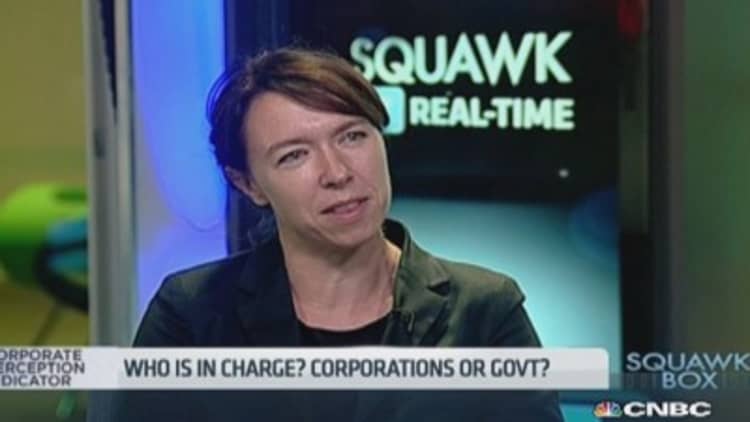
People from emerging economies are much more comfortable in strong corporations having influence over government than in developed nations, a CNBC/Bursen-Marsteller poll survey has found.
Most emerging markets' respondents –whether from the public or executives - surveyed in the CNBC/Bursen-Marsteller poll on the Global Corporate Compass viewed strong and influential corporations as engines for innovation and economic growth.
However, in the developed world, opinion was split. Indeed, in seven out of the 13 developed nations included in the survey, the public believe that strong and influential corporations "rig the system so that they do not have to act responsibly," the survey reported. These include economic powerhouses such as the U.S., U.K., Germany and Hong Kong.
Surprisingly, people in France and Italy sided with emerging markets in their belief that strong and influential businesses can boost the economy.
For Tamsin Cave, director of Spinwatch and author of "A quiet Word: Lobbying, Crony Capitalism and Broken Politics in Britain", there's now a "growing disquiet among the public (in the developed world) about this relationship between government and big business".
The public in the U.K., she added, feels that there is a disconnect between politicians and the public. "The public voice isn't heard because of the enormity of what is a corporate lobbying industry - worth something like £2 billion ($3.2 billion) in the country," she said.
Even executives across the developed world were of two minds with C-suite respondents in Germany, Italy, Singapore and Australia describing strong and influential corporations as bad.
"I have a saying", said Gary Greenberg, head of emerging markets at Hermes. "The way you can tell the difference between emerging markets and developed markets is that in emerging markets the government controls the banks whereas in developed markets it is the opposite!"
Read MoreWe all agree: Governments are corrupt, corporations profit-minded
Corporations in emerging markets are "the key provider of jobs, whereas in the developed world, unemployment is viewed as more of a political issues", Peter Attard Montalto, emerging market economist at Nomura told CNBC to explain the clear difference in opinion.
"It is a matter of net benefit to society", added Gary Greenberg.
"Corporations in emerging markets are seen as generator of employment, and therefore wealth, not to mention the provision of previously unavailable goods and services."
"Corporations in the U.S. are seen as serving (wealthy) shareholder interests to the detriment of society," Greenberg concluded.
Furthermore, while the public in all developed nations surveyed think that corporations have "too much" influence over the government, only four emerging markets agree – Mexico, Brazil, Columbia and Poland.
Read MoreRich and poor alike are worried about income gap
In most emerging economies – Russia, India, Indonesia, Malaysia, Turkey and the United Arab Emirates –the public viewed companies' influence over the state as the "appropriate amount".
Strong businesses in emerging markets, Peter Attard Montalto added, offer an "alternative voice over over-bearing government rule and more fragile institutions" and are therefore viewed positively.
In China and South Africa, the general public is of the opinion that companies do not have enough influence over state matters.
Corporations in these two countries, explained Nomura's Attard Montalto, are considered "far too quiet in national policy discussions" around issues such as corruption and tendering and there's a general fear that the government has too much influence over the economy.
Read MoreDo companies pay 'fair share'? Depends whom you ask
Although South Africa executives agreed with public opinion, executives in China, however, responded that corporations' influence over the government was the appropriate amount.
At the opposite end of the spectrum, despite both the public and executives in Russia agreeing that the government has the most influence in their daily lives, they also believe that the government has "too little" influence over corporations.


